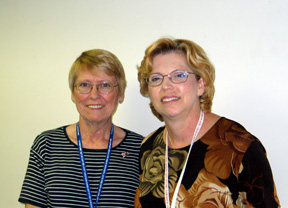 |
Nancy Schneckloth, left, and Alice Bernhards are volunteers with the Reach to Recovery program. |
Today, Bernhards volunteers for the American Cancer Society’s Reach to Recovery program.
“It’s rewarding to give somebody information that I didn’t get myself,” said Bernhards, clerical lead of internal medicine, University Medical Associates.
Coordinating the program on campus
Nancy Schneckloth, a 14-year breast cancer survivor, started the Reach to Recovery program at UNMC and its hospital partner, The Nebraska Medical Center, in 1991. She continues to coordinate the program on the medical center campus and would like to see more medical center patients referred to Reach to Recovery.
Nationally, Reach to Recovery began more than 30 years ago with volunteers — all breast cancer survivors — offering support, understanding and resources to anyone facing breast cancer. Volunteers receive on-going training through the American Cancer Society.
Sending a message of hope
“Our message is hope and encouragement,” said Schneckloth, assistant professor emeritus of the UNMC College of Nursing, and clinical nurse specialist of perioperative services of The Nebraska Medical Center.
Bernhards agrees: “We can let others know they’re not the only person this has ever happened to and that they can survive and get through this. It’s really a scary time for a woman.”
Matching patients and volunteers
A physician, health-care professional, spouse, friend, family member, or the patient may contact the Reach to Recovery coordinator. The coordinator matches the person with a volunteer who has had similarities in her breast cancer experience, is near the same age, or has other important personal characteristics. The volunteer then contacts the patient, listens to her concerns and offers emotional support. Volunteers also provide patients with printed materials, but do not give medical advice or personal opinions. Instead, they encourage the patient to speak to her physician about medical concerns.
Providing facts and support
Bernhards and Schneckloth said breast cancer patients – whether men or women — experience a range of emotions from fear to anger. The majority of patients with breast cancer are women, although a small number of men also develop the disease, they said. The Reach to Recovery program can help, they said, by giving people the facts and the support they need.
“Cancer isn’t a death sentence,” said Bernhards, who encourages women to get mammograms and do self-breast exams. “The best defenses anyone can have are awareness, facts and support.”
For more information
For more information about breast cancer or Reach to Recovery call 1-800-ACS-2345 or visit www.cancer.org. Individuals also may contact Schneckloth at 552-3292 for information or to refer medical center patients to Reach to Recovery.